|
|
|
Sort Order |
|
|
|
Items / Page
|
|
|
|
|
|
|
| Srl | Item |
| 1 |
ID:
130866


|
|
|
|
|
| Publication |
2014.
|
| Summary/Abstract |
Curbing corruption is vital for China's future. But the exposure of corruption cases can only damage public confidence in the CCP and the state more generally. Corruption associated with toxic food, bogus medicines, grave abuses of power and criminal 'black societies' has produced a series of public scandals in China. Without reform, further occurrences could rapidly erode the legitimacy not just of the police and other judicial organs, but also of the ruling Chinese Communist Party (CCP). The recent trial of Bo Xilai, the former Chongqing party secretary and member of the party's elite 25-member Politburo, showcased the kind of corruption that China's past president Hu Jintao warned could lead to 'the collapse of the Party and the downfall of the state'. In 2011, the Bank of China inadvertently reported that between 1994-2008 as many as 18,000 corrupt officials had fled the country for destinations in Europe, America and other parts of Asia, plundering an estimated $120 billion from state-owned enterprises and other criminal activities. The costs of maintaining domestic public order have also grown rapidly, and, for the first time, domestic security outlays approved by the 2012 National People's Congress (NPC) exceeded defence, in part over concerns about the growth of mass protests, fraud, corruption and organised crime, and the need to strengthen weiwen (stability) and social harmony.
|
|
|
|
|
|
|
|
|
|
|
|
|
|
|
|
| 2 |
ID:
150067
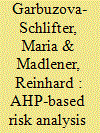

|
|
|
|
|
| Summary/Abstract |
Understanding and properly managing risks that could potentially affect the target- and performance-based profits of energy performance contracting (EPC) projects are essential. It is particularly important for the establishment and success of energy service companies (ESCOs) acting in the vulnerable environment of the vast but highly energy-inefficient Russian market. This study systematically explores common risk factors and causes of risk associated with EPC projects executed in three Russian sectors: (1) industrial; (2) housing and communal services; and (3) public. Several interviews with the Russian EPC experts were accomplished and a qualitative risk assessment by using an analytic hierarchy process (AHP) approach. The data were obtained from a web-based questionnaire survey conducted among Russian EPC project executors. For each focus sector, a specific preference-based ranking of the identified risk factors and causes of risk was derived. The AHP results show that causes of risk related to the financial and regulatory aspects contribute most to the riskiness of EPC projects performed in all three focus sectors in Russia, calling for the special attention of EPC policy- and business-makers. Due to sectorial particularities and different actors involved, we conclude that there is a need for elaboration of sector-specific contractual schemes for EPC projects.
|
|
|
|
|
|
|
|
|
|
|
|
|
|
|
|
| 3 |
ID:
153360
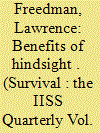

|
|
|
|
|
| Summary/Abstract |
This article draws largely on my experience as the Official Historian of the Falklands Campaign, and then as a member of the UK inquiry into the Iraq War. My aim is to explore the particular challenges faced when charged with holding ministers, officials and officers directly to account. Although I was solely responsible for the Falklands history, I was part of a team working on the Iraq Inquiry, led by Sir John Chilcot. Not only am I speaking for myself, but it is not my intention to offer revelations about the workings of the inquiry.1 In practice, the work was relatively straightforward. Despite pre-publication comments about the length of the report and the time it had taken to prepare, the reasons for this were apparent on publication. The panel stuck together despite irritating and at times intrusive media speculation; the report’s findings did not leak in advance; and any disagreements, which rarely touched on the broad thrust of the report, were always settled without fuss. Compared with other inquiries, we were not even that expensive. Academics and former mandarins come at a discount to lawyers.
|
|
|
|
|
|
|
|
|
|
|
|
|
|
|
|
| 4 |
ID:
078775


|
|
|
|
|
| Publication |
2007.
|
| Summary/Abstract |
This article offers a biopolitical security analytic of kidnap and ransom (K&R) insurance. It suggests that security phenomena should be analysed in terms of the problematizations through which they are expressed. With reference to Foucault's concept of biopower, K&R insurance is studied as part of a security dispositif designed to deal with the problematic of kidnap risk. The biopolitical security that results is aimed at enabling the circulation of the client should a kidnap event occur. As such, it is a personalized private provision of security premised upon the promotion of an individual's capacity to circulate in the future. Using the story of a kidnap event, the article analyses the micro-practices through which a population of `kidnapping prospects' is created, the underwriting process through which prospective clients undergo a security audit, and the forms of security that derive from this dispositif. It argues that the value of the concept of biopower for security analysis is its potential for explaining problematics that are not circumscribed to a fixed referent object but relate to the emergent features of the changing character of the human being
|
|
|
|
|
|
|
|
|
|
|
|
|
|
|
|
| 5 |
ID:
105787


|
|
|
|
|
| Publication |
2011.
|
| Summary/Abstract |
The study evaluates the energy saving potential of the Chinese steel industry by studying its potential future energy efficiency gap. In order to predict the future energy efficiency gap, a multivariate regression model combined with risk analysis is developed to estimate future energy intensity of China's steel industry. It is found that R&D intensity, energy saving investment, labor productivity and industry concentration are all important variables that affect energy intensity. We assess the possible measures as to how China's steel industry can narrow the energy efficiency gap with Japan by means of scenario analysis. Using Japan's current energy efficiency level as baseline, the energy saving potential of China's steel industry is more than 200 million ton coal equivalent in 2008, and it would fall to zero in 2020. However, if greater efforts were made to conserve energy, it would be possible to narrow down the energy efficiency gap between China and Japan by around 2015. Finally, using the results of the scenario analysis, future policy priorities for energy conservation in China's steel industry are assessed in this paper.
|
|
|
|
|
|
|
|
|
|
|
|
|
|
|
|
| 6 |
ID:
128846
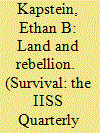

|
|
|
|
|
| Publication |
2014.
|
| Summary/Abstract |
A study of land reform illuminates the paradox of economic instruments in counter-insurgency. Where redistributive demands are at the core of a rebellion, foreign powers will find it difficult to respond effectively. Recent years have seen the United States and its allies embroiled in major counter-insurgency campaigns in Afghanistan and Iraq, and lesser operations in such countries as Yemen and Somalia. These battles against local insurgencies are only the latest in a string of such conflicts that have erupted in nearly every developing region since the end of the Second World War. Sharply debated at home and abroad, they raise the fundamental question of what the counter-insurgents can reasonably hope to achieve in violent settings, even when they deploy an array of military, political and economic instruments. What are the 'moving parts' that foreign powers can manipulate in their efforts to force or encourage violence-reducing reforms in these societies?
|
|
|
|
|
|
|
|
|
|
|
|
|
|
|
|
| 7 |
ID:
178268
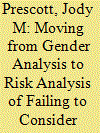

|
|
|
|
|
| Summary/Abstract |
In wars fought within and ultimately for the support of civilian populations, the gender dimension becomes a vital one. Different efforts to address gender in military operations have shown increasing sophistication in the past few years. One thing that has not been satisfactorily developed, however, is an overarching theory of gender’s operational relevance that would allow it to be fully normalised in military planning and operations. To fill this gap, Jody M Prescott suggests that the gender analysis that is part of military staff products at all operational levels needs to evolve to also consider risk to the mission and its personnel.
|
|
|
|
|
|
|
|
|
|
|
|
|
|
|
|
| 8 |
ID:
132465
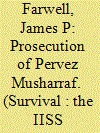

|
|
|
|
|
| Publication |
2014.
|
| Summary/Abstract |
In 2013, Pakistan's interior minister, Chaudhry Nisar Ali Khan, announced that the government would formally proceed with the prosecution of former President Pervez Musharraf on charges of treason for suspending the country's constitution in 2007, imposing emergency rule, and sacking most of the judiciary. Khan was not bluffing. Musharraf was indicted for high treason under Article 6 of the constitution, a charge that could carry the death penalty. A special court was set up to hear the case. Adding to Musharraf's woes, a 237-page report by the Federal Investigative Agency released last May denounced Musharraf's declaration of a state of emergency as illegal and in the service of his own 'ulterior motives'. The detailed report marshals significant evidence that Musharraf acted by fiat, without consulting other officials (such as his own prime minister, Shaukat Aziz) as required by law.
|
|
|
|
|
|
|
|
|
|
|
|
|
|
|
|
| 9 |
ID:
132464
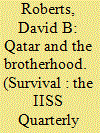

|
|
|
|
|
| Publication |
2014.
|
| Summary/Abstract |
In June this year, an Egyptian court's decision to sentence three Al-Jazeera journalists to lengthy prison terms marked a new low in deteriorating Qatar-Egypt relations, but was only one among many international-relations difficulties that the small Gulf state has faced in recent years. The tenure of Emir Tamim bin Hamad Al Thani, who ascended to the throne in summer 2013, has been something of an annus horribilis for Qatar, even in terms of the country's relations with its fellow Gulf Cooperation Council (GCC) states, with which it has much in common. Against a backdrop of sporadic intra-regional problems, the latest iteration of these difficulties crystallised in early March, when Saudi Arabia, the UAE and Bahrain took the unprecedented step of withdrawing their ambassadors from Qatar en masse.
|
|
|
|
|
|
|
|
|
|
|
|
|
|
|
|
| 10 |
ID:
130869
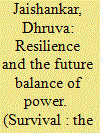

|
|
|
|
|
| Publication |
2014.
|
| Summary/Abstract |
There is more to power than the traditional indicators of resources, influence and perception. Not long ago - in the 1980s, in fact - the US policy community was in the throes of a high-stakes debate about the nature and extent of Soviet power. On one side was a large group who believed that the United States was losing ground to an increasingly powerful and aggressive Soviet Union. Proponents of this view pointed to the shifting balance of conventional military power in favour of Moscow, particularly in Europe, and to Soviet aggression in places such as Afghanistan. As a consequence, many American policymakers advocated increases in military spending to balance against the Soviet Union, a position that was also supported by many in the US military establishment. Others who shared this perspective proposed a more conciliatory and accommodating approach towards their rival, one that was helped along by Soviet leader Mikhail Gorbachev's move towards glasnost, and which was eventually manifested in arms-control talks between Washington and Moscow.
|
|
|
|
|
|
|
|
|
|
|
|
|
|
|
|
| 11 |
ID:
117916
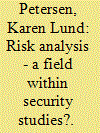

|
|
|
|
|
| Publication |
2012.
|
| Summary/Abstract |
The academic environments of risk analysis and security studies had hardly 'spoken' to one another until recently. The two fields of study were defined within different academic disciplines: security studies a matter for International Relations (IR), and risk studies a matter for sociology, economics and the natural sciences. Increased focus on catastrophic events (terrorism, climate change, etc.) seems to have given the fields of security studies and risk analysis a common empirical theme and highlighted the need for a common research agenda. This article explores the intersection between these two fields of study, as it investigates how the 'old' disciplinary debates on risk have been translated 'into' security studies - to predict, criticize or evaluate the current political practice of security. Such analysis provides a much-needed overview of the risk debates within security studies and brings out the limits of this debate in light of the broader and much more historically settled risk debates within sociology, economics and anthropology.
|
|
|
|
|
|
|
|
|
|
|
|
|
|
|
|
| 12 |
ID:
109710
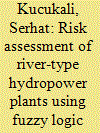

|
|
|
|
|
| Publication |
2011.
|
| Summary/Abstract |
In this paper, a fuzzy rating tool was developed for river-type hydropower plant projects, and risk assessment and expert judgments were utilized instead of probabilistic reasoning. The methodology is a multi-criteria decision analysis, which provides a flexible and easily understood way to analyze project risks. The external risks, which are partly under the control of companies, were considered in the model. A total of eleven classes of risk factors were determined based on the expert interviews, field studies and literature review as follows: site geology, land use, environmental issues, grid connection, social acceptance, macroeconomic, natural hazards, change of laws and regulations, terrorism, access to infrastructure and revenue. The relative importance of risk factors was determined from the survey results. The survey was conducted with the experts that have experience in the construction of river-type hydropower schemes. The survey results revealed that the site geology and environmental issues were considered as the most important risks. The new risk assessment method enabled a Risk Index (R) value to be calculated, establishing a 4-grade evaluation system. The proposed risk analysis will give investors a more rational basis to make decisions and it can prevent cost and schedule overruns.
|
|
|
|
|
|
|
|
|
|
|
|
|
|
|
|
| 13 |
ID:
178022
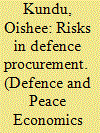

|
|
|
|
|
| Summary/Abstract |
Although there exist several remarkable theories that facilitate the understanding of procurement risks in imperfect market conditions, methods to quantify the impact and identify the most severe risks are less well known. This paper uses the method of risk analysis to discuss defence procurement challenges in India. An original dataset of 88 contracts has been created to identify the most probable and the most severe causes for poor procurement performance. A schedule performance parameter has been constructed to quantify the impact of different adverse events. The findings display a high probability of technological risks followed by contractual risks as the cause for delays in Indian defence procurement. Technological risks are concentrated in cases of indigenous procurement due to a lack of infrastructure and resources while contractual risks mostly occur in contracts where the Ministry of Defence deals with external agents like foreign suppliers. This indicates frictions and transaction costs. These and other findings from the quantitative data on procurement performance are supplemented by insights from an extensive fieldwork in India which included 53 interviews.
|
|
|
|
|
|
|
|
|
|
|
|
|
|
|
|
| 14 |
ID:
132473
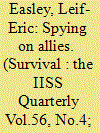

|
|
|
|
|
| Publication |
2014.
|
| Summary/Abstract |
Although some programmes crossed lines of propriety, US surveillance of partners did not constitute a breach of trust.
The United States is accused of monitoring the communications of other countries and collecting data on Internet users worldwide, following disclosures made by Edward Snowden, a former National Security Agency (NSA) contractor. US President Barack Obama implied that he did not order the NSA programmes for listening in on over 35 world leaders, including not only those of threatening states, but also those of allies, friendly countries and the United Nations.
|
|
|
|
|
|
|
|
|
|
|
|
|
|
|
|
| 15 |
ID:
132472
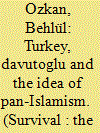

|
|
|
|
|
| Publication |
2014.
|
| Summary/Abstract |
Turkey's foreign minister was the first intellectual to devise a rationalistic and pragmatic Islamist foreign policy. Five years in office have exposed a huge gap between his ambitions and the country's ability to achieve them.
Over the past decade, Turkey's foreign policy has been synonymous with Ahmet Davutoglu and his doctrine of 'stratejik derinlik' (strategic depth). In 2010-11 he was on Foreign Policy's list of the 'Top 100 Global Thinkers'. Yet, despite this popular interest in Davutoglu, there are few academic studies of his foreign policy. He devised Turkey's current, pan-Islamist approach in his work as an academic during 1986-2002, detailing his vision in hundreds of articles published in that period. Davutoglu consistently argued that the end of the Cold War provided Turkey with a historic opportunity to become a global power, as long as it followed an expansionist foreign policy based on Islamist ideology. According to Davutoglu, Turkey was to dominate its hinterland - the Middle East, the Balkans and the Caucasus - and thereby create a new Lebensraum (he uses the Turkish words 'hayat alani', which is a direct translation of the German Lebensraum, or 'living space'). He began to turn his pan-Islamist vision into reality after 2002, following his appointment as foreign-policy adviser to the ruling Justice and Development Party (AKP), a position he held until he was made foreign minister in 2009.
|
|
|
|
|
|
|
|
|
|
|
|
|
|
|
|
|
|
|
|
|